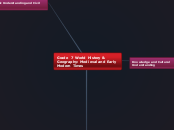Grade 7 World History & Geography: Medieval and Early Modern Times
Skills Attainment and Social Participation
Basic Study Skills
CCSS.ELA-Literacy.RH.6-8.7 Integrate visual information (e.g., in charts, graphs, photographs, videos, or maps) with other information in print and digital texts.
H-SS AS: Students use a variety of maps and documents to identify physical and cultural features of neighborhoods, cities, states, and countries and to explain the historical migration of people, expansion and disintegration of empires, and the growth of economic systems.
CCSS.ELA-Literacy.WHST.6-8.8 Gather relevant information from multiple print and digital sources (primary and secondary), using search terms effectively; assess the credibility and accuracy of each source; and quote or paraphrase the data and conclusions of others while avoiding plagiarism and following a standard format for citation.
H-SS AS: Students frame questions that can be answered by historical study and research.
CCSS.ELA-Literacy.RH.6-8.1 Cite specific textual evidence to support analysis of primary and secondary sources.
Critical Thinking Skills
CCSS.ELA-Literacy.WHST.6-8.4 Produce clear and coherent writing in which the development, organization, and style are appropriate to task, purpose, and audience.
CCSS.ELA-Literacy.RH.6-8.9 Analyze the relationship between a primary and secondary source on the same topic.
H-SS AS: Students assess the credibility of primary and secondary sources and draw sound conclusions from them.
CCSS.ELA-Literacy.RH.6-8.4 Determine the meaning of words and phrases as they are used in a text, including vocabulary specific to domains related to history/social studies.
Participation Skills
CCSS.ELA-Literacy.WHST.6-8.9 Draw evidence from informational texts to support analysis reflection, and research.
CCSS.ELA-Literacy.RH.6-8.5 Describe how a text presents information (e.g., sequentially, comparatively, causally).
CCSS.ELA-Literacy.RH.6-8.2 Determine the central ideas or information of a primary or secondary source; provide an accurate summary of the source distinct from prior knowledge or opinions.
H-SS AS: Students detect the different historical points of view on historical events and determine the context in which the historical statements were made (the questions asked, sources used, author’s perspectives).
Democratic Understanding and Civil Values
Civic Values, Rights, and Responsibilities
Constitutional Heritage
7.11.6 Discuss how the principles in the Magna Carta were embodied in such documents as the English Bill of Rights and the American Declaration of Independence.
7.10.3 Understand the scientific method advanced by Bacon and Descartes, the influence of new scientific rationalism on the growth of democratic ideas, and the coexistence of science with traditional religious beliefs.
7.6.5 Know the significance of developments in medieval English legal and constitutional practices and their importance in the rise of modern democratic thought and representative institutions (e.g., Magna Carta, parliament, development of habeas corpus, an independent judiciary in England).
National Identity
No Relevant Standards
Knowledge and Cultural Understanding
Sociopolitical Literacy
7.11.5 Describe how democratic thought and institutions were influenced by Enlightenment thinkers (e.g., John Locke, Charles-Louis Montesquieu, American founders).
7.10.1 Discuss the roots of the Scientific Revolution (e.g., Greek rationalism; Jewish, Christian, and Muslim science; Renaissance humanism; new knowledge from global exploration).
7.1.1 Study the early strengths and lasting contributions of Rome (e.g., significance of Roman citizenship; rights under Roman law; Roman art, architecture, engineering, and philosophy; preservation and transmission of Christianity) and its ultimate internal weaknesses (e.g., rise of autonomous military powers within the empire, undermining of citizenship by the growth of corruption and slavery, lack of education, and distribution of news).
Economic Literacy
7.11.3 Examine the origins of modern capitalism; the influence of mercantilism and cottage industry; the elements and importance of a market economy in seventeenth-century Europe; the changing international trading and marketing patterns, including their locations on a world map; and the influence of explorers and map makers.
7.9.2 Describe the theological, political, and economic ideas of the major figures during the Reformation (e.g., Desiderius Erasmus, Martin Luther, John Calvin, William Tyndale).
7.3.4. Understand the importance of both overland trade and maritime expeditions between China and other civilizations in the Mongol Ascendancy and Ming Dynasty.
Geographic Literacy
7.8.2 Explain the importance of Florence in the early stages of the Renaissance and the growth of independent trading cities (e.g., Venice), with emphasis on the cities' importance in the spread of Renaissance ideas.
7.7.3 Explain how and where each empire arose and how the Aztec and Incan empires were defeated by the Spanish.
7.6.1 Study the geography of the Europe and the Eurasian land mass, including its location, topography, waterways, vegetation, and climate and their relationship to ways of life in Medieval Europe.
Cultural Literacy
7.5.1 Describe the significance of Japan's proximity to China and Korea and the intellectual, linguistic, religious, and philosophical influence of those countries on Japan.
7.3.3 Analyze the influences of Confucianism and changes in Confucian thought during the Sung and Mongol periods.
7.2.6 Understand the intellectual exchanges among Muslim scholars of Eurasia and Africa and the contributions Muslim scholars made to later civilizations in the areas of science, geography, mathematics, philosophy, medicine, art, and literature.
Ethical Literacy
7.7.2 Study the roles of people in each society, including class structures, family life, war-fare, religious beliefs and practices, and slavery.
7.4.5 Describe the importance of written and oral traditions in the transmission of African history and culture.
7.2.3 Explain the significance of the Qur'an and the Sunnah as the primary sources of Islamic beliefs, practice, and law, and their influence in Muslims' daily life.
Historical Literacy
7.5.3 Describe the values, social customs, and traditions prescribed by the lord-vassal system consisting of shogun, daimyo, and samurai and the lasting influence of the warrior code in the twentieth century.
7.2.4 Discuss the expansion of Muslim rule through military conquests and treaties, emphasizing the cultural blending within Muslim civilization and the spread and acceptance of Islam and the Arabic language.
7.1.3 Describe the establishment by Constantine of the new capital in Constantinople and the development of the Byzantine Empire, with an emphasis on the consequences of the development of two distinct European civilizations, Eastern Orthodox and Roman Catholic, and their two distinct views on church-state relations.

